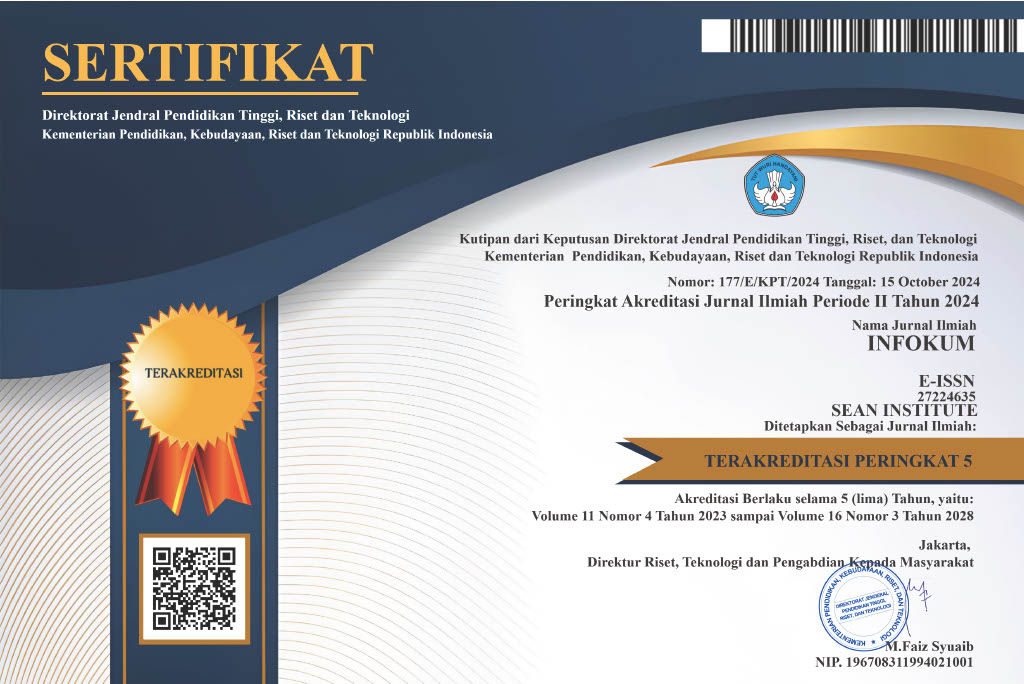Knowledge Management In the Development of State Civil Apparatus in the Honorary Council of Election Organizers of the Republic of Indonesia (DKPP RI)
Abstract
The study aims to identify the causes of the suboptimal implementation of Knowledge Management in ASN development and formulate strategies to optimize its implementation. The research method used is a descriptive qualitative method with an inductive approach, using the SECI theory by Nonaka and Takeuchi and the SWOT analysis theory by Albert Humphrey. Data collection techniques include observation, interviews, and documentation. The results of the study indicate that at the socialization stage, the lack of two-way communication, minimal incentives for sharing knowledge, and low interest in training are the main obstacles. At the externalization stage, weaknesses in document management and organizational discussions hinder the transformation of tacit knowledge into explicit knowledge. The combination stage is disrupted due to the ineffectiveness of the database system, which has an impact on decision making and career development. Meanwhile, at the internalization stage, limited Information Technology infrastructure, weak internet networks, and lack of mass media utilization slow down organizational learning. These findings emphasize the need to strengthen the system, knowledge sharing culture, and adequate technology and communication support to encourage effective knowledge management at the DKPP RI. Strategies that can be carried out by overcoming weaknesses include limited human resources, low budget, and lack of supporting facilities and infrastructure. Strategic opportunities lie in increasing human resource capacity, strengthening infrastructure, increasing budgets, and preparing internal regulations related to knowledge management. Meanwhile, the main challenges include disparities in employee education levels and the lack of ongoing evaluation and policies. By utilizing existing strengths and opportunities and anticipating weaknesses and threats, DKPP RI can build a more structured, sustainable knowledge management system that supports improving institutional performance.
Downloads
References
Creswell, John W. 2016. Research Design: Pendekatan Metode Kualitatif. Kuantitatif dan Campuran, Edisi 4. Yogyakarta : Pustaka Pelajar.
Djamarah, Syaiful Bahri. 2003. Prestasi Belajar dan Kompetensi Guru. Surabaya: Usaha Nasional.
Djohan. 1998. Demokrasi Representasi dan Sistem pemilu (WIDYA PRAJA No. 26 Tahun XVII, 1997) IIP.
Effendy, Khasan. 2009. Pengembangan Organisasi (Moratorium dan Morbitarium Pemekaran). Bandung:Indra Prahasta.
_____, 2010. Sosiologi Pemerintahan. Bandung: CV Indra Prahasta.
_____, 2016. Memadukan Metode Kuantitatif Kualitatif. Bandung: Prahasta
Fahmi, Irham. 2017. Manajemen Sumber Daya Manusia Teori dan Aplikasi. Bandung : CV. Alfabeta.
Fernandez, Beccera. 2015. Knowledge Management System and Procesess. New York:Routledge.
Francis J, Gouillart dan James N, Kelly. 1995. Transforming the Organization. San Bruno Public Library: USA. Digitized by the Internet Archive in 2016 with funding from Kahle/Austin Foundation.
Frappaolo, Carl. 2002. Knowledge Management. Britania Raya: Capstone Publishing.
Garrison, Noreen, dan Brewer. 2007. Akuntansi Manajerial. Edisi ke-11. Jakarta : Salemba Empat.
Hajric, Emil. 2018. Knowledge Management System & Practices. Kindle Edition.
Handoko, T. Hani. 2001. Manajemen Personalia dan SDM. Yogyakarta:BPFE.
Harsono. 2011. Etnografi Pendidikan sebagai Desain Penelitian Kualitatif. Surakarta: Universitas Muhammadiyah Surakarta.
Hasbulah. 2012. Dasar-Dasar Ilmu Pendidikan. Jakarta: Raja Grafindo Persada.
Kadarisman, M. 2013. Manajemen Pengembangan Sumber Daya Manusia. Jakarta: Rajawali Pers.
Robbins dan Judge. 2016. Perilaku Organisasi (Organizational Behavior) Edisi 16, Jakarta: Penerbit: Salemba Empat
Widjaja, HAW. 2011. Otonomi Daerah Dan Daerah Otonom. Jakarta: PT. Grafindo.
Winardi. 1990. Azas-Azas Manajemen. Bandung: Mandar Maju.
Agung Prihartono, (2015) Prototipe Knowledge Management System Informasi Akademik Pada Akademi Sekretari Budi Luhur.
Candra Setyo Nugroho, (2019) Strategi Peningkatan Kinerja Sektor Publik dalam Perspektif Knowledge Management (Studi Pada Pusat Pelatihan Dan Pengembangan Dan Pemetaan Kompetensi Aparatur Sipil Negara Lembaga Administrasi Negara)
Yeni Anriana Harahap. 2016. Penerapan Knowledge Management pada badan perencanaan pembangunan daerah kota pekanbaru. Vol.3 No.2 Universitas Riau.
Undang-Undang Republik Indonesia Nomor 23 Tahun 2014 Tentang Pemerintahan Daerah.
Undang-Undang Nomor 25 Tahun 2009 Tentang Pelayanan Publik.
Undang-Undang Nomor 5 Tahun 2015 Tentang Aparatur Sipil Negara.









